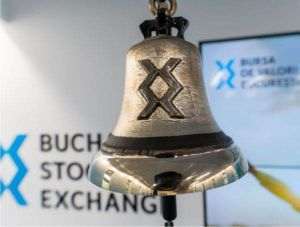
Actualizare 15:08
O ştire Bloomberg arată că şi Rabobank Groep a acceptat planul guvernamental. Banca va constitui provizioane de 500 de milioane de euro în acest an pentru compensarea a circa 9.000 de clienţi, cărora le-au fost vândute 11.000 de contracte swap pe dobânzi între 2005 şi 2010, după constituirea unor provizioane de 200 de milioane de euro în 2015, conform declaraţiilor purtătorului de cuvânt al băncii.
(C.R.)
--------------
O comisie a guvernului Olandei a determinat că mai multe bănci de pe piaţa locală s-au angajat în practici abuzive şi nu şi-au informat corect clienţii cu privire la natura instrumentelor financiare vândute odată cu acordarea unor credite, conform unei ştiri Bloomberg.
Cele şase bănci care apar în raportul guvernamental au vândut circa 18.000 de contracte swap pe rata dobânzii unor firme mici şi mijlocii între 2005 şi 2010. Instrumentele financiare derivate aveau rolul de a proteja debitorii împotriva creşterii dobânzilor, însă ancheta a dezvăluit faptul că aceste contracte nu au fost adecvate nevoilor companiilor, deoarece a existat, de cele mai multe ori, o neconcordanţă între instrumentele swap şi creditele acordate.
"Companiile au acuzat băncile că nu le-au informat pe deplin cu privire la modul de funcţionare a contractelor swap şi a riscurilor aferente", mai arată Bloomberg. Riscurile s-au materializat după declanşarea crizei globale sub forma unei creşteri explozive a costurilor pentru companii.
Patru dintre băncile anchetate, între care se regăsesc ING Groep NV şi ABN Amro Group NV, au acceptat să plătească despăgubiri de ordinul sutelor de milioane de euro, în timp ce Rabobank Groep şi Deutsche Bank AG încă nu au decis dacă vor accepta planul guvernamental.
Comisia guvernamentală a mai stabilită că băncile trebuie să plătească şi despăgubiri individuale de până la 100.000 de euro pentru dobânda suplimentară pe care au plătit-o companiile.
Un purtător de cuvânt al Rabobank, care a vândut clienţilor circa 8.000 de contracte swap, a declarat pentru Bloomberg că banca nu este de acord cu modul în care s-au calculat despăgubirile.
În cazul ABN Amro, care este deţinută în proporţie de 77% de guvern, provizioanele pentru compensarea a circa 6.800 de clienţi se ridică la 360 de milioane de euro, iar ING va aloca provizioane de 150 de milioane de euro.
Cea mai veche bancă independentă din Olanda, Van Lanschot NV, înfiinţată în 1737, a anunţat că va constitui provizioane de 11 milioane de euro pentru plata despăgubirilor, în timp ce SNS Bank, care a fost naţionalizată în 2013, va anunţa valoarea provizionului la prezentarea raportului financiar din august 2016.
Conform estimărilor preluate de Bloomberg, dacă toate cele şase bănci acceptă planul guvernamental, valoarea totală a despăgubirilor va depăşi 1 miliard de euro.
Jeroen Dijsselbloem, ministrul de finanţe al Olandei şi preşedintele Eurogrupului, a cerut şi celor două bănci "dizidente" să accepte cât mai curând planul guvernamental.
Conform informaţiilor din Wikipedia, banca Van Lanschot se poziţionează pe piaţă drept un "manager de active independent", care este "dedicat creării şi conservării avuţiei clienţilor săi".
Probabil că un "crez" similar este promovat şi de celelalte instituţii financiare, însă lipsa de etică în relaţia cu clienţii mai puţin informaţi nu mai poate fi acoperită de cuvintele mari.
Despăgubirile de un miliard de euro reprezintă, astfel, costul cel mai mic plătit de băncile din Olanda. Incomparabil mai mare este costul pierderii credibilităţii în ceea ce priveşte "competenţa" instituţiilor financiare şi, mai ales, al pierderii încrederii clienţilor, pe fondul unui deficit de etică alimentat de tiparniţa băncilor centrale şi tratamentul preferenţial al autorităţilor europene.































































1. fără titlu
(mesaj trimis de anonim în data de 07.07.2016, 00:55)
In toata lumea, bancile dau socoteala pentru mizeriile facute clientilor, doar la noi sunt tinute in brate de bnr si guvern. Asa se intampla cand ai un stat slab, mafia creste
2. fără titlu
(mesaj trimis de anonim în data de 07.07.2016, 09:39)
Banci care au fost nationalizate din bani oamenilor acum platesc amenzi tot din bani oamenilor.
Ce capitalism este acesta?
3. Lantul trofic
(mesaj trimis de Dan Coe în data de 07.07.2016, 09:49)
Bancile au ajuns in fruntea lantului trofic capitalist, in concluzie sunt cel mai mare "pradator", asa functineaza sistemul si la noi si aiurea.
3.1. fără titlu (răspuns la opinia nr. 3)
(mesaj trimis de anonim în data de 07.07.2016, 09:54)
Cand ajungi in varf incepe sfarsitul. Bancile contesta suveranitatea statelor in care functioneaza si de unde fac bani, au devenit mamuti transnationali care concureaza constructiile statale. Paralelismul cu templuerii e bun, bancile trebuie readuse sub controlul statelor. Ele, nu teroristii, sunt cel mai important inamic al statelor moderne
3.2. fără titlu (răspuns la opinia nr. 3.1)
(mesaj trimis de anonim în data de 07.07.2016, 13:30)
Da cu 3.
4. fără titlu
(mesaj trimis de anonim în data de 07.07.2016, 13:35)
Realitatea este mult mai nuantata decat guvernul olandez o prezinta. Sau o prezinta acest articol. Cine vrea sa citeasca tot contextul si cum trateaza instantele din Olanda, sa citeasca mai jos. Fapt este ca guvernul olandez se pregateste si el de alegeri. Si ce motiv mai bun decat sa tragi o palma bancherilor. Dar sa vedem realitatea asa cum este.
Interest rate swaps litigation
In recent years banks have increasingly come under fire in the Netherlands in relation to interest rate swaps sold to small and medium-sized enterprises. The debate has been fuelled by low variable interest rates and higher fees for liquidity and credit default risks. This has given rise to a considerable and ever-growing flow of litigation, which has attracted the attention of the national regulatory authorities1 and the Dutch Parliament. This article examines some of the common client complaints emerging in the litigation, and summarises how the Dutch courts have responded.
Varying grounds of complaints
Interest rate swap litigation in the Netherlands generally involves one or more of the following complaints by investors:
(i) Misinformation about overhedges: The value of the fictional sum for an interest swap is sometimes higher than the actual amount of the loan. In these "overhedge" situations, the client pays the fixed interest on the difference between the fictional sum and the loan amount, but receives variable interest on the same amount from the bank. If the fixed interest rate is higher than the variable interest, clients often claim to have been misinformed about the consequences of overhedges.
(ii) Fees: Swap agreements do not always cover additional amounts which are owed by the client to the bank, such as fees for liquidity or credit default risks. If these fees are not covered by the swap agreement, the client is not secured against fluctuations of these fees. Clients claim to have been unaware of the fact that they were not secured against such fluctuations.
(iii) Early payment: Since a swap is from the underlying loan agreement, termination of the loan agreement does not automatically result in termination of the swap agreement. Payment obligations under a swap agreement remain valid, even where the underlying loan is repaid before the anticipated termination date. Termination before maturity of a swap agreement that has a negative value (ie the fixed interest rate under the swap is higher than the variable interest rate under the loan) requires the client to pay the negative value of the swap for the remaining duration of the swap, plus costs and buy-out penalties in connection with such early termination. As such, clients claim that they were not informed that the swap does not automatically terminate on early repayment of the underlying loan.
Developing in case law
Claimants generally claim (a) termination of the swap agreement on the basis of error (dwaling) or (b) damages based on a breach of the bank's duty of care.
Termination for error
Dutch courts have generally been reluctant to accept claims for termination of a swap agreement on the basis of error. In recent case law, the courts have ruled that information about swaps, provided by banks to their clients, was sufficiently clear about the associated risks.2 Furthermore, the courts have ruled that clients have a responsibility to assess the relevant information and seek specialist advice when entering into swap agreements.3
Breach of duty of care
Central to discussion concerning a bank's duty of care is whether the bank's duty to disclose information about a swap supersedes the client's obligation to investigate, and whether the bank is responsible for warning the client about specific risks related to the swap.
In general, the courts have found that a bank must properly inform the client about the specific characteristics and potential risks of the swap, and the client must make a reasonable effort to understand the swap and request additional information if necessary.4 Circumstances that are relevant in a court's assessment of whether the bank has complied with its duty are: (i) the knowledge and experience of the parties; (ii) whether the swap has been explained by a bank representative in a meeting with the client; and (iii) which party initiated the swap agreement. So, depending on the court's assessment of these factors in any given case, information in swap documentation on, for example, costs and risks, may or may not be sufficient.
There has been an inconsistent approach to how the knowledge and experience of small and medium-sized enterprises is assessed by Dutch courts. Some courts take into account the fact that the client has specialised knowledge in-house or that it has engaged specialist legal advice when entering into the swap agreement, thus leading to the dismissal of the claim or a reduction in damages.5 Other courts argue that small and medium sized enterprises, that are not considered to be a professional client under MiFID, should be treated as a non-professional party from a duty of care perspective. As a consequence, these courts rule that banks have an increased duty of care towards these parties.6 While acting counterparty in a swap transaction does not qualify as offering investment services under MiFID, MiFID concepts are determining the level of duty of care banks should take into account towards clients in swap transactions.
Some Dutch courts qualify the relationship between a bank and its clients as an advisory relationship, even though the swap agreement expressly states that the bank only acted as swap counterparty.7 The courts are ignoring the execution-only relationship between the bank and the client, and assuming an advisory relationship regardless of what was stated in the contract. Previous case law has shown that banks that are advising their clients must act in the interests of those clients.8 This requires a much higher level of care than that required in a counterparty relationship, namely taking the reasonable interests of its clients in to account.
COMMENT
Dutch court decisions on swap arrangements differ in essential respects, such as the assessment of the client's knowledge and experience and the level of the bank's duty of care. Inconsistency in the way that courts have imposed a higher level of duty of care by redefining the relationship between a bank and the client, or assuming a lower level of knowledge and experience for small and medium-sized enterprises, makes it difficult for banks to assess their risk. It is hoped that the Dutch Supreme Court will soon provide some much-needed clarity to this area.
4.1. fără titlu (răspuns la opinia nr. 4)
(mesaj trimis de anonim în data de 07.07.2016, 14:34)
In realitate oricate copy-paste-uri produci transpiri la fel. Bulgarele antiparazitism bancar a pornit la vale, creste in volum si vine in est. :))))
4.2. fără titlu (răspuns la opinia nr. 4.1)
(mesaj trimis de anonim în data de 07.07.2016, 15:17)
Nu este niciun bulgare, debitardule. Este teatru pentru prosti. Statele sunt in campanie electorala. In Olanda, in Romania. Te-ai intrebat de ce ARB nu este mai vocala? De ce, in afara unor interviuri palide, nu face mai mult? De ce bancile olandeze nu contesta? Sau accepta mormaind? Desi, potrivit instantelor olandeze, bancile au mai mult dreptate decat au abuzat de clienti. Stii de ce?
Pentru ca este un acord tacit intre politicieni (aceia care conteaza, nu alde Zamfir) si sistemul bancar. Acesta se preface ca este pedepsit. Politicienii se prefac mari eroi. Bancherii ii sprijina tocmai pentru ca stiu ca vor recupera acele miliarde in doar cateva luni prin titluri de stat, comisioane de la clienti si altele.
Bancherii accepta teatrul politicienilor pe banii contribuabilului. Iar tonti precum cei ca tine urla in peluza si aplauda frenetic.
4.3. fără titlu (răspuns la opinia nr. 4.2)
(mesaj trimis de anonim în data de 07.07.2016, 15:19)
Stii cand sunt alegerile pe care Rutte vrea sa le castige in Olanda? Trimestrul 1 din 2017. Adica mai au sase luni pana la campania electorala. Exact cate erau si inainte de promulgarea ldp din mai 2016, la sase luni inainte de alegerile din nov 2016.
4.4. fără titlu (răspuns la opinia nr. 4.3)
(mesaj trimis de anonim în data de 07.07.2016, 15:23)
Dar amanarea proceselor chf prin trimiterea la ICCJ pana in oct-nov 2016? Nu are nicio legatura cu alegerile din nov 2016? Da, si marmota invelea cadouri pentru prostii multi din popor.
4.5. fără titlu (răspuns la opinia nr. 4.1)
(mesaj trimis de anonim în data de 07.07.2016, 15:38)
ha ha ha, te-ai intrebat daca provizioanele sunt deductibile in olanda?
daca sunt, atunci tot cetateanul plateste amenda incasand impozit mai mic de la banci, ha ha ha ha
4.6. fără titlu (răspuns la opinia nr. 4.2)
(mesaj trimis de anonim în data de 07.07.2016, 16:47)
Corect.
4.7. fără titlu (răspuns la opinia nr. 4.5)
(mesaj trimis de anonim în data de 07.07.2016, 16:49)
Cine imparte parte isi face.
4.8. fără titlu (răspuns la opinia nr. 4.7)
(mesaj trimis de anonim în data de 07.07.2016, 17:08)
Fii atent aici.
Declaratie de avere Zamfir PNL:
7 terenuri, 2 case, 4 masini, cash 40 mii lei, datorii 250 de mii de euro
(acum aflam si salariul Oanei Stancu de la A3, are 80 000 euro in 2015)
Declaratie de avere Busoi PNL:
9 terenuri, 4 case, bijuterii 50000 euro, cash cca 2 milioane euro, datorii 200 de mii euro
Acum, avem cazul Zamfir, un speculator cu terenuri care are foarte putine active financiare. Si il avem pe Busoi cu 2 milioane cash (nu cash, investiti in diferite produse financiare).
Cand bancherii fac lobby, la cine crezi ca fac? La Zamfir agricultorul? Sau la Busoi, superior in partid, si care intelege produsele bancare? Cine va fi mai sensibil la argumentele bancherilor?
4.9. fără titlu (răspuns la opinia nr. 4.8)
(mesaj trimis de anonim în data de 07.07.2016, 18:17)
Looby nu e reglementat la noi, deci mita.